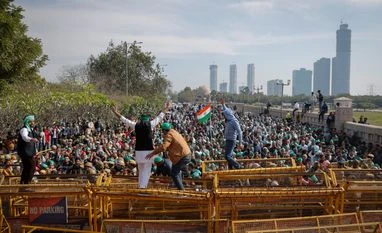In preparation for the upcoming march by thousands of farmers to Delhi on Tuesday, the Haryana government has converted two stadiums into makeshift jails.
The Chaudhary Dalbir Singh Indoor Stadium in Sirsa and the Guru Gobind Singh Stadium in Dabwali will serve as temporary detention facilities for farmers who are detained or imprisoned during the march, sources told NDTV.
These temporary jails will be used if any adverse situations arise as a result of the farmers' protest, they added.
Preparations underway to stall farmers
The Haryana and Delhi Police have also erected concrete barricades at the Tikri border in Jhajjar's Bahadurgarh and Singhu in Sonepat, as well as water cannons and massive cemented containers at the Sonepat border.
Road spikes, barbed wires, and a large deployment of police personnel have also been reported along the interstate border.
More From This Section
Curbs imposed in Delhi, Haryana, and Uttar Pradesh
Section 144 of the Code of Criminal Procedure (CrPC) has been enforced in 15 of Haryana's 22 districts, while the Sonepat district government has placed a 10-litre limit on diesel filling at petrol pumps for farmers' tractors. Similar restrictions under Section 144 have been implemented at Uttar Pradesh's Ghazipur, Tikri, and Singhu borders.
The Delhi Police has prohibited public gatherings at all Delhi-Uttar Pradesh borders, as well as adjoining locations within the northeast district's authority.
In addition, Haryana has sealed the border with Punjab at Shambhu, near Ambala. Extensive measures have been made to halt the march at the border in Jind and Fatehabad districts. The state government has also suspended mobile internet services and bulk SMS in seven districts - Ambala, Kurukshetra, Kaithal, Jind, Hisar, Fatehabad, and Sirsa - from February 11 to 13.
The protest, organised by the Samyukta Kisan Morcha and various farmer associations mainly from Uttar Pradesh, Haryana, and Punjab, seeks to persuade the central government to address their demands, including the implementation of a law ensuring a minimum support price (MSP) for crops.
)